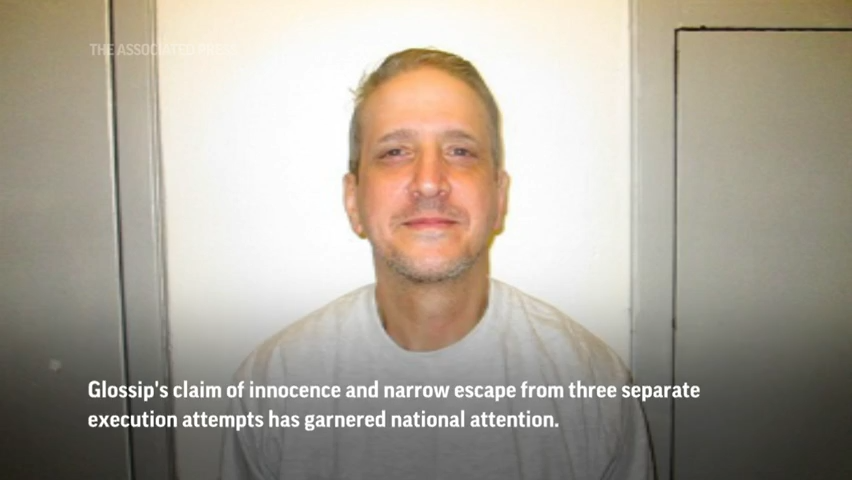Why this Oklahoma death row inmate from Galesburg should be freed, according to supporters

A little more than a week after a federal judge rejected a legal challenge to Oklahoma's execution protocol, which paves the way for executions to continue here, supporters of a death row inmate from Galesburg, Illinois, released what they say is an independent investigative report proving his innocence.
Richard Glossip, a 59-year-old former motel manager and current death row inmate twice-convicted of orchestrating the 1997 murder of his boss, Barry Alan Van Treese, at the Best Budget Inn in Oklahoma City, is not guilty, according to a Republican lawmaker and an out-of-state attorney tasked with conducting an investigation into the case.
“The independent investigation confirmed, in my mind, that we do have an innocent man on death row,” Rep. Kevin McDugle, R-Broken Arrow, who has been at the forefront of pushing for the case's review, said during a Wednesday news conference at the state Capitol.
Previously: Case of Galesburg native Richard Glossip case featured in four-part TV series

Glossip was born in Galesburg, where relatives still reside. He was born in Cottage Hospital in 1963 to Heron and Sally Glossip. By the time he moved out at the age of 14, Richard was one of 16 siblings in the Glossip home.
Justin Sneed, a motel maintenance man who killed Van Treese by beating him to death with a baseball bat, received a sentence of life without parole after testifying that Glossip offered to pay him $10,000 for the murder so Glossip wouldn’t be fired.
McDugle and other supporters have fought to keep the case in public view, and enlisted the help of international law firm Reed Smith, which touts its work to overturn death penalty sentences, to look into the case pro bono.
On Wednesday, the law firm released its 343-page investigative report on the Glossip case.
Previously: Galesburg native remains on death row
Details of the investigation
Reed Smith said its attorneys and several investigators spent nearly four months reviewing documents and conducting interviews with people related to the case.

The investigators reached out to two relatives of Van Treese, but neither responded, according to the report. The law firm says they were not granted an interview with Sneed, who is serving his sentence at Joseph Harp Correctional Center in Lexington.
The report claims the state had “flimsy evidence of corroboration to support a murder conviction,” and that physical evidence “supports a robbery gone bad conclusion,” with Sneed committing the murder by himself.
Stan Perry, a partner with the firm, said the Oklahoma Police Department, at the direction of the Oklahoma County District Attorney’s Office, destroyed several key pieces of crime scene evidence in 1999, before Glossip’s retrial.
Previously: 'Innocent people are dying in this country'
Perry said the evidence included financial records disproving the theory Glossip was embezzling money and had Van Treese killed before he could fire Glossip.
No “reasonable” juror “would’ve convicted Richard Glossip of capital murder,” Perry said at the Oklahoma Capitol on Wednesday.
The Oklahoma County district attorneys at the time were Bob Macy, followed by Wes Lane.
Current District Attorney David Prater told The Oklahoman the District Attorney’s Office would not order the destruction of evidence in a capital murder case, and according to exhibits in Reed Smith’s own report, if the evidence in question was destroyed, it appears to have been initiated and completed by the Oklahoma City Police Department.
“I directly refute their claim that there is direct evidence that an assistant district attorney ordered this evidence to be destroyed upon return to the Oklahoma City Police Department,” Prater said.
Discussions about death penalty
Earlier this month, U.S. District Judge Stephen Friot ruled the state’s execution protocol does not violate a constitutional ban against cruel and unusual punishment.
The decision cleared the way for the state to carry out up to 28 executions by legal injection over the next two years.
Inmates had complained the sedative midazolam — the first drug in the three-drug process — doesn't work. They contended they will feel extreme pain as the second and third drugs take effect.
Friot disagreed, finding it highly probable that an inmate will feel no pain "within a very short time after the midazolam is pushed."
The judge pointed out the Supreme Court has said an inmate is not guaranteed a painless death and that courts "do not sit as boards of inquiry charged with determining best practices for executions."
Oklahoma resumed executions in October after the practice was halted for for more than six years. Three inmates were executed after Friot kicked them out of the legal challenge. One was never in the case.
Glossip was to have been executed on Sept. 30, 2015, at the Oklahoma State Penitentiary in McAlester. The lethal injection procedure was called off after a doctor discovered the wrong deadly drug had been supplied.
On June 10, Attorney General John O'Connor asked the Oklahoma Court of Criminal Appeals to set execution dates for 25 of the 28 convicted murderers who lost the legal challenge to the state's lethal injection protocol.
Executions could resume as early as August, with Glossip scheduled to be second in line to be put to death.
McDugle called for a new appeals court hearing to review Glossip's case.
McDugle said he is a supporter of the death penalty, but he fought back tears Wednesday as he discussed Glossip.
“If we put Richard Glossip to death, I will fight in this state to abolish the death penalty,” he said.
Does Illinois have the death penalty?
The last execution to be carried out in Illinois was in 1999, before Republican Gov. George Ryan issued a moratorium and later emptied death row, believing the system too fraught with mistakes to be tenable. Illinois had executed 12 people in the decades since the U.S. Supreme Court reinstated capital punishment in 1976, but 13 people had been freed because of questions about their guilt. Democratic Gov. Pat Quinn officially abolished the death penalty in 2011.
The Register-Mail and Associated Press contributed to this report.
This article originally appeared on Oklahoman: Advocates say Oklahoma death row inmate Richard Glossip should be free

